Rockbridge Academy Blog
How Working from a Place of Rest Led to Conference Time and Python
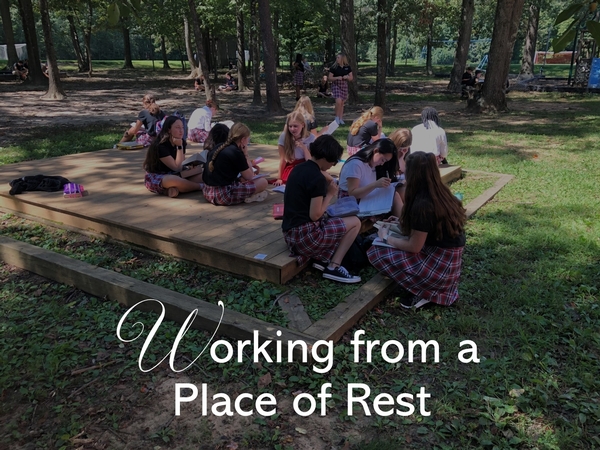
Student life dramatically changed when Rockbridge Academy implemented Conference Time at the beginning of the 2021-2022 school year. Now, all students in grades seven through twelve enjoy a 30-minute period after the 20-minute lunch break and 15 minutes set aside for recess, mentoring, or service. Conference Time was designed for students to be used as a built-in study hall, an opportunity to make or attend clubs, and an ideal meeting time with teachers. In the past, students could only meet for clubs and with teachers during lunch, which would take away time that could be spent with friends, eating, or recharging for the upcoming classes. With the development of Conference Time, students can enjoy more freedom and opportunities to connect with others from different grades and stages of life.
According to Mandy Ball, Upper School Principal of Rockbridge Academy, one of the inspirations behind Conference Time was the idea of “working from a place of rest,” one of Rockridge Academy's core values. She went on to say that this designated time in the school day allows for students “to do things necessary for flourishing and not just surviving.” The administrators hope that Conference Time allows students to experience a break from the busy school day and the ability to expand their own areas of interest through clubs.
Students have the option to use Conference Time as a free period for taking a break during which they can decide for themselves the wisest way to manage their time. This could include using the time as a study hall, which was one of the main reasons for its implementation, so that students have the daily opportunity to relieve work from their busy schedules. The time can also be used to meet up with teachers, which I assure you can be very helpful when answering last-minute questions before a Chemistry test! In addition to using it for school related activities, it can be used to simply take a break by chatting with friends, drawing, or perusing the library. Conference Time gives students more freedom, yet also allows them to practice time regulation.
Conference Time has been instrumental in the growth of clubs which, in turn, allow students to grow themselves in ways that differ from their academics. Rockbridge now boasts over 15 unique clubs for students in the dialectic and rhetoric years (7-12). These clubs give students the opportunity to bond over hobbies and interests that might not otherwise be covered in the Rockbridge curriculum, allowing friendships to flourish regardless of age differences. These clubs span topics such as sports, food, art, and communal prayer time, all working to make Rockbridge a more well-rounded learning environment.
A new development for Conference Time this year is a secondary rhetoric Python programming elective which takes place during Tuesday and Thursday Conference Times. This rhetoric elective is open to students in the calculus math track and taught by upper school teacher, Daron Lawing. Mrs. Ball said that the school has been trying to include a secondary elective for some time now, but it was difficult because of the early dismissals for sports on Tuesdays and Thursdays. She stressed that this elective is a pilot intended to test whether students will be able to handle another elective in their busy schedules.
Many students were excited about the programming option and its reflection of the growing STEM programs at Rockbridge. Python was chosen because it shows the application of math to the real world and how the realms of math and language intersect. Mrs. Ball also made the important clarification that, just like all Rockbridge science classes, the goal of this program is “not STEM for STEM’s sake but for looking at all of God’s creation.” This elective gives students the chance to learn the basics of coding and to further explore the unique designs of our Creator.
The entire development of Conference Time has been a blessing to the Rockbridge community, allowing growth in every area of the school and providing the ability for students, as well as staff, to have a more communal and holistic school experience. Through these changes, Rockbridge students have benefited from the freedom to participate in clubs, new electives, and a quiet break from the day which allows for a healthier learning environment where students can truly work from a place of rest.
Sophia Berger (class of 2025) is in 11th grade and currently serves as the Editor-in-Chief of the school newspaper, The Rockbridge Reporter. In her spare time, she enjoys reading, playing the flute, and going on walks.
Classical Christian Math?
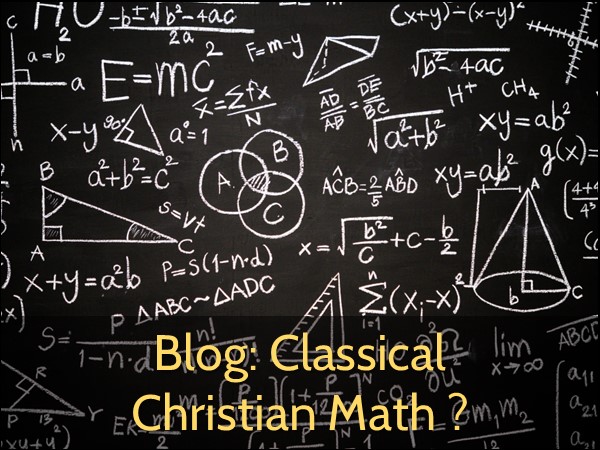
If you look up the course offerings at my local public high school, you’ll notice some stark differences between their classes and those offered here at Rockbridge Academy. Instead of Literature of Antiquity, you’ll see English 11. Instead of theology courses like Bibliology and Hermeneutics, you’ll find Honors Comparative Religions. I think it’s probably safe to say that Rockbridge will never offer Business of Fashion. I’m equally sure that, were the roles reversed, someone looking at our course catalog would wonder what in the world Great Ideas I and II are all about!
Despite these obvious differences, there is one area where our course catalogues are quite similar; in fact, every single class we offer in this discipline is also taught at my local public school under the exact same name. I’m speaking, of course, of mathematics. You can find all our classes, from Pre-Algebra to Calculus, at any middle or high school down the street from you.
Does this mean that a public-school math class and a Rockbridge math class are the same? They have the exact same name after all!
The answer is a resounding no!
To be sure, there are many similarities between Rockbridge math classes and public-school math classes. The math concepts themselves do not change of course, and we all want students to be proficient in problem solving and successful in any future mathematical endeavors.
These similarities are far from the whole story, however. There are many differences between Rockbridge math classes and those in other educational settings. These differences arise because we do not have the same educational paradigm. Rockbridge teaches math from a classical, Christian perspective; other educational institutions do not.
What does this look like? Both pieces, classical and Christian, profoundly affect the way Rockbridge math teachers teach our classes.
To teach math classically has many components. First, there is an emphasis on conceptual understanding and eloquent expression of that understanding. We want our students to deeply grasp the concepts they are learning. We do not merely want them to know how to solve a particular problem; we also want them to understand the mathematical principles at play in that problem. Furthermore, we want them to express their understanding in an eloquent way. This occurs through informal class discussion, where students consistently use technical math vocabulary, and through formal assessments such as oral presentations and essay questions. (Yes–you read that right–there are essay questions on our math tests!) Putting an idea into words is an excellent metric to judge true understanding, and we require this often in our math classes.
A second aspect of classical mathematics is an emphasis on history and historical context. We try to give our students a sense of where each concept falls in math history and discuss the important mathematicians who contributed the ideas, as well as where they fit into the larger context of world history. While we are not having daily history lessons (our class time is focused on mathematical content proper!), providing historical context whenever possible is a key component of classical mathematics classes.
A third element of classical mathematics is an emphasis on the integration of ideas, both within our classes and with the rest of the curriculum. Mathematics is an internally consistent body of knowledge, and we want our students to see how each concept they are learning integrates into one cohesive whole. We also want our students to see how mathematics is integrated with the rest of the curriculum. The most obvious point of integration is with science, which uses math as a language to model natural phenomena. While this is the clearest place for integration, it is far from the only place! Mathematics teaches us about aesthetics, much of its vocabulary has Latin roots, it has its own history as I mentioned above, and it engenders many interesting philosophical discussions.
Mathematics can even tell us about theology, or, more properly, theology can tell us a lot about mathematics. This leads us to the Christian component of a classical, Christian math classroom. We believe and teach our students that studying math gives us a glimpse into the mind of the Creator. The consistency, orderliness, logic, and creativity of God are all reflected in math, and in a world where relativism is the ideology of the day, math provides a picture of the objectivity and certainty of God’s Word. By studying math, students learn about the character and goodness of God. Ultimately, mathematics class is an opportunity to worship the creator of mathematics.
We certainly hope each of our students learns a lot of math concepts, expresses them clearly, understands the historical context, and can integrate ideas inside and outside the mathematics curriculum. We hope most of all, however, that our students walk away filled with wonder for our great Creator.
While there are many excellent math classes at schools of all kinds across the country where students build conceptual understanding, hone problem-solving skills, and become equipped for future callings, only in a classical, Christian math class do students get an excellent mathematical education from an explicitly Christian worldview.
So do not be fooled by the fact that our classes have the same name. The classical, Christian math classes at Rockbridge Academy are significantly different from the math classes at the local public school. And we math teachers wouldn’t have it any other way!
Monica Davis has taught all manner of 10th through 12th grade math classes at Rockbridge Academy for the last 9 years. When she is not delighting in math with her students, she enjoys cooking, baking, going for walks, and spending time with friends and family, especially her baby Theo and husband Josh, who is a Rockbridge Academy alumnus from the Class of 2004.
STEM at Rockbridge Academy
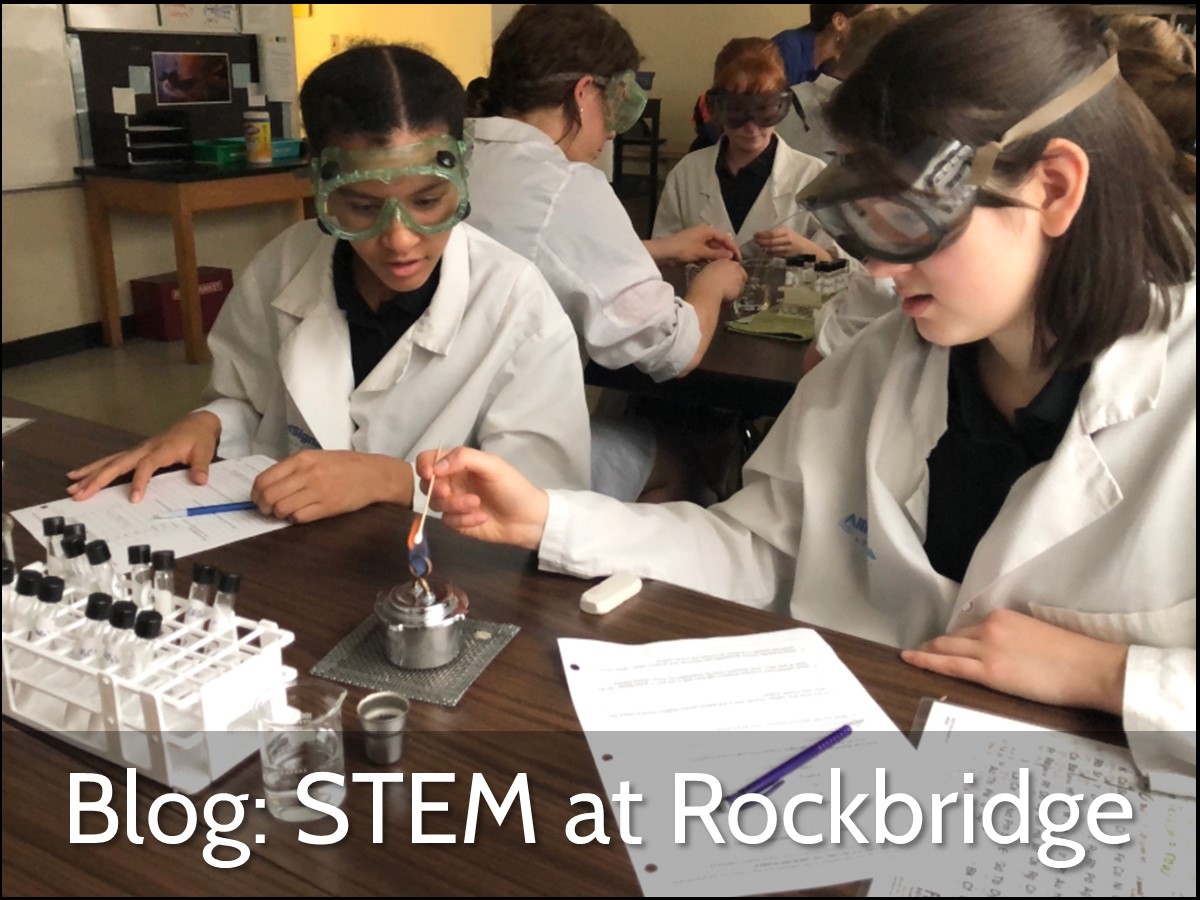
Eighth-grader Theodore Grev had a problem. Every time he camped, his sleeping hammock gave him trouble. Setting up at night in the woods, he couldn’t see to secure the knots for his tarp covering. Sometimes the tarp would blow away in the middle of the night, leaving him cold and wet.
Something had to be done.
When he saw the invitation for the Rockbridge STEM Club (Science, Technology, Engineering, and Math), Theodore decided to turn his problem into a science project. Quarantining at home during the summer COVID shutdown, he built one configuration after another, carefully recording the amount of time it took to set up each model. He finally settled on the best one: it took 8 minutes and 30 seconds to assemble and stayed up all night without fail. This winter, he entered it the Regional Science and Engineering Expo. He and his friends have also started using it on their camping trips, with great success.
Theodore is just one of several participants in the STEM Club at Rockbridge Academy.
Other projects this year have included creating an accurate clock with a 3D printer; designing a walking robot; building a low-pollution cooking stove to save lives in the third world; and testing the safety of personal passwords. The club’s record is strong. Last year, freshman Josh Phillips took home 6 awards for his “Cooking Shouldn’t Kill” cookstove design. The year before that, junior Ryan McDowell took his computer security project to the Intel International Science and Engineering Fair (ISEF) and won a “Cyber Pioneer” honorable mention from the National Security Agency.
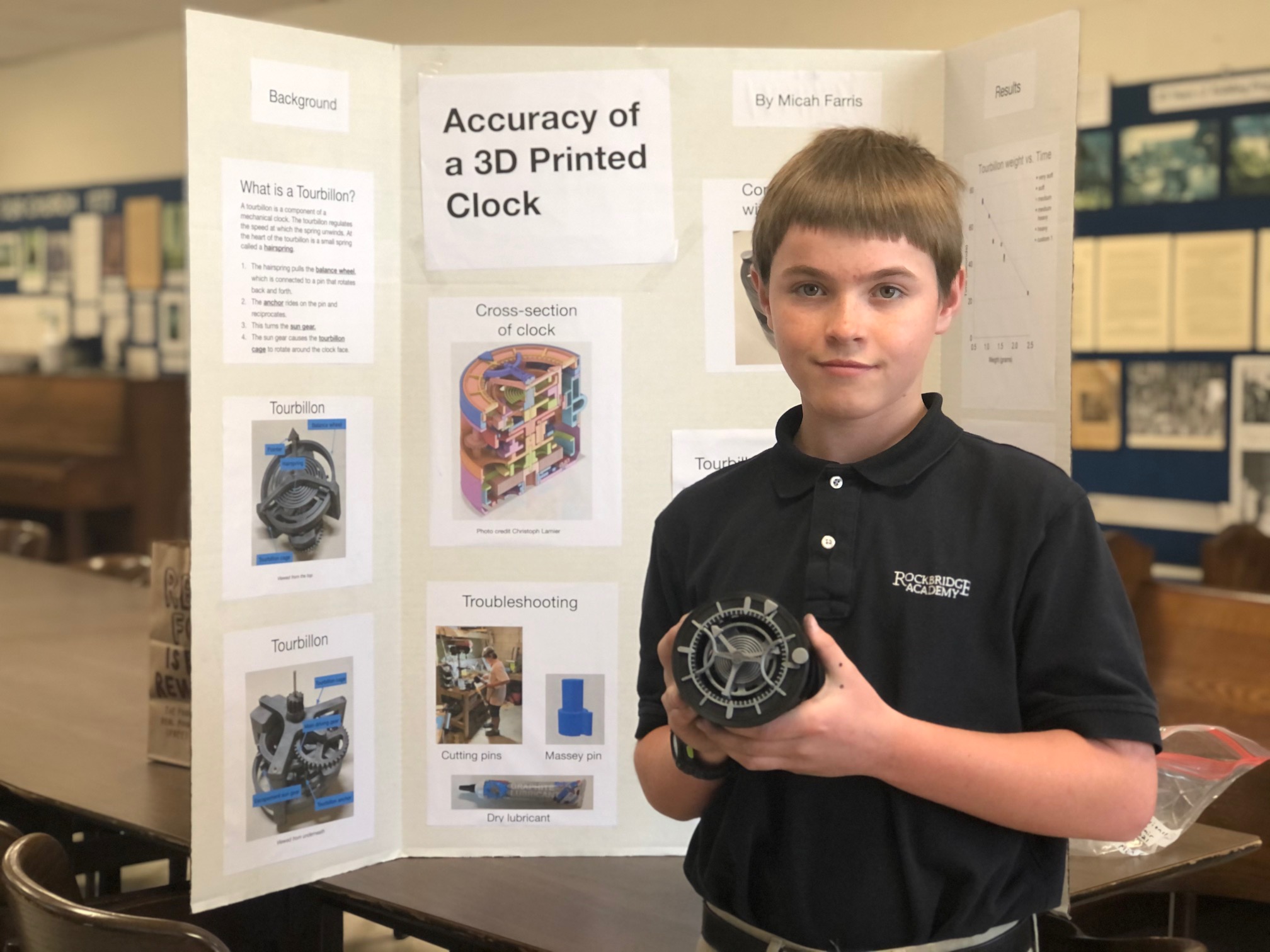 How does this work at a classical, Christian school of only 165 middle and high school students? As STEM fields are promoted more heavily in the culture, classical, Christian schools—usually much smaller than their public counterparts—are often questioned about their ability to measure up.
How does this work at a classical, Christian school of only 165 middle and high school students? As STEM fields are promoted more heavily in the culture, classical, Christian schools—usually much smaller than their public counterparts—are often questioned about their ability to measure up.
At Rockbridge Academy, the curriculum includes a strong STEM track of earth science, biology, chemistry, and physics; algebra, geometry, trigonometry, and calculus; and analytical science and logic, which train students to test arguments and formulate proofs. For several years, Rockbridge students have also participated in the American Math Competition and regional and state-wide Science Olympiads, placing well in both.
The study of science and math is historically classical and Christian—grounded firmly in the liberal arts and driven by a desire to comprehend Creation. Classical educators like to quote Apple founder Steve Jobs: “Technology alone is not enough…it’s technology married with liberal arts, married with the humanities, that yields us the result that makes our hearts sing.”
“Technology alone is not enough…it’s technology married with liberal arts, married with the humanities, that yields us the result that makes our hearts sing.” Steve jobs
At Rockbridge, watching students at work DOES make the heart sing.
Cathy Phillips, a graduate of the US Naval Academy with a degree in aero engineering, started the Rockbridge STEM Club when her son Josh was entering high school. Josh had always had a scientific bent, and she wanted to provide an opportunity for students like him to pursue that bent beyond the classroom.
Mrs. Phillips sees excellence in math and the sciences as flowing naturally from a classical education, which girds students with a strong foundation in facts, then invites them to ask the “why” behind those facts—and equips them to present their findings with skill and winsomeness. She notes that classically educated students typically have a strong desire to learn and a strong background in critical thinking. This translates into excellent questions and the persevering spirit to bring their projects to completion.
This year’s participants are competing in a variety of events: the Maryland Engineering Challenge, the County Regional Science and Engineering Expo, and the Junior Science and Humanities Symposium,
Freshman Michael Grube is building a remote-controlled model cargo ship for the Maryland Engineering Challenge. He’s grappling with college-level math and nautical design, but Rockbridge has trained him in fundamental math concepts that are serving him well. Also for the Challenge, sisters Kait and Maddie Atwood are working with Sean Fitch to design and build a walking robot that walks on 2 legs over uneven terrain. And Josh Phillips created a bridge design for the “Wood Bridge Challenge” category of the competition and won first place!
Theodore Grev entered his practical hammock design in the County Regional Science and Engineering Expo. Seventh-grader Micah Farris, who has always had a bent for engineering and enjoys experimenting on his own, decided to create his own clock with a 3D printer. Both of them took 2nd place. The printing took about 100 hours, and there were long days (and nights) of assembling and disassembling the clock, testing different springs, recording the results again and again. Thankfully, he says, his training at Rockbridge had already trained him to be persistent.
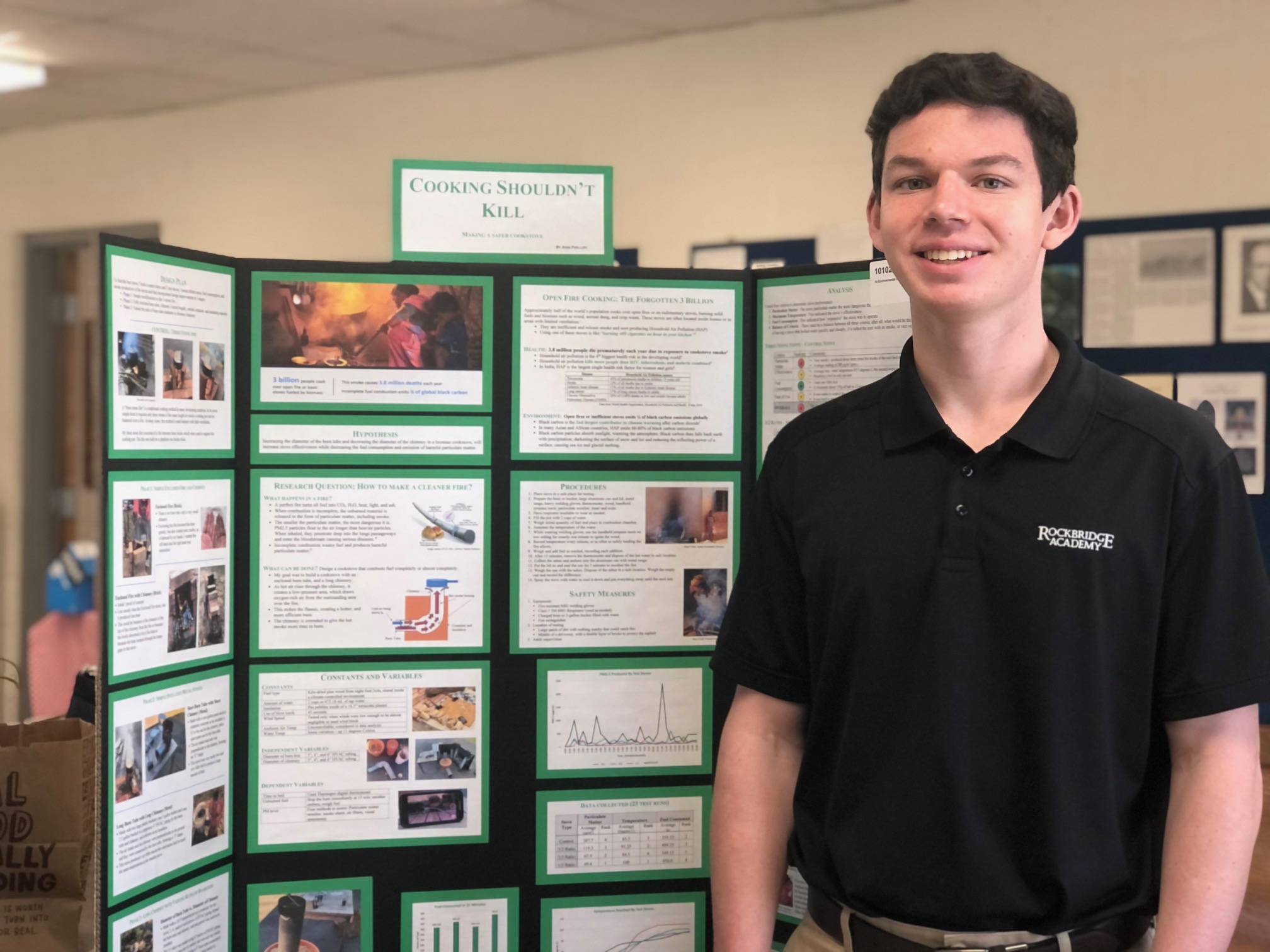 Josh Phillips, who won 6 county awards for his “Cooking Shouldn’t Kill” cookstove design last year, has improved his design and is taking it to the Junior Science and Humanities Symposium (a DOD competition) in 2021. Juniors Emma Williams and Hannah Skwarek decided to examine the effectiveness of common password security questions. After winning the approval of an Institutional Review Board, they conducted multiple interviews, collected online data from their subjects, and determined which questions offer greater security. They are off to compete on the national level.
Josh Phillips, who won 6 county awards for his “Cooking Shouldn’t Kill” cookstove design last year, has improved his design and is taking it to the Junior Science and Humanities Symposium (a DOD competition) in 2021. Juniors Emma Williams and Hannah Skwarek decided to examine the effectiveness of common password security questions. After winning the approval of an Institutional Review Board, they conducted multiple interviews, collected online data from their subjects, and determined which questions offer greater security. They are off to compete on the national level.
Writing and presenting the final project for a panel of experts is a major component of all of these competitions. Yet the students consistently expressed that that was the “easy part.” At Rockbridge, they’ve been honing those skills for years.
While small classical schools may not offer a wide array of specialized math and science classes, they do offer classes that are rigorous, deep, and integrated with one another. In a STEM world that changes with blinding speed and often denies the existence of God, classical Christian education trains adept and willing learners—all while affirming the beauty of creation and greatness of the Creator. These competitions don’t just introduce students to a STEM network of friends and colleagues; they also give them opportunities to shine the light of Christ to a world that needs Him.

I just read your text about Classical Christian Math and I found it really interesting.
I am a mathematician who has only taught university courses but I have always thought about how I would want my chidren (which I hope to have soon) to learn Math in a way which made them really appreciate all the effort our ancestors have done to get us here and also to see how the glory o God manifests itself through Math.
Your text gave me a very nice perspective on how to approach the topic when the time to educate my children in Math comes.
Regards
Daniel Souza